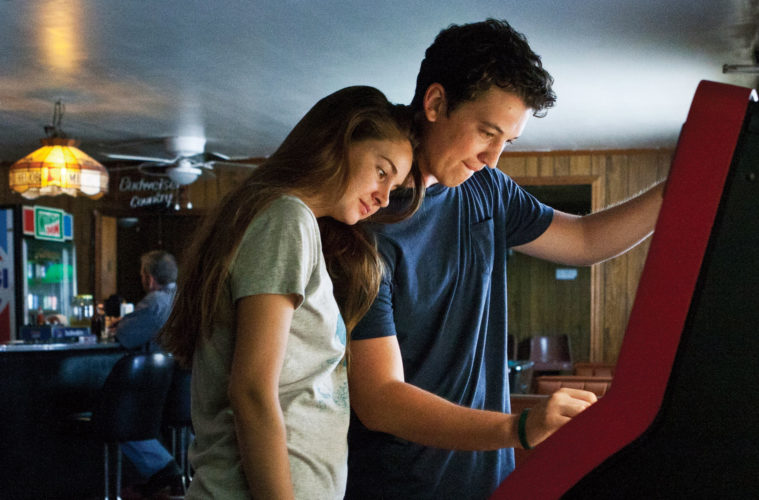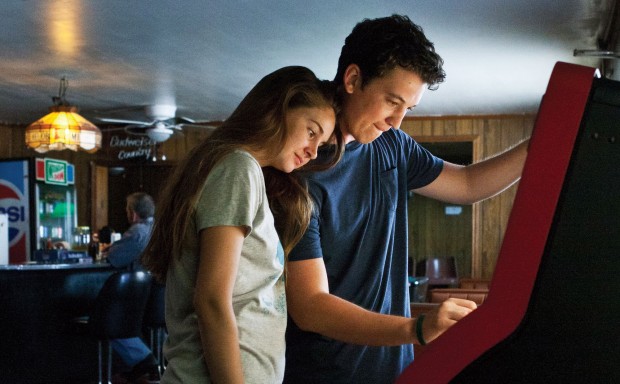
Screenwriters Michael Weber and Scott Neustadter made a name for themselves with the hit (500) Days of Summer and then returned to Sundance this year with their latest work, The Spectacular Now. Set around the high school experience of Sutter (Miles Teller), the film is tragic, upbeat, and raw. With an outstanding performance by Shailene Woodley, the film is a who’s who of young rising stars and isn’t to be missed as it expands across the United States.
I was able to talk with both Weber and Neustadter on the phone last week to discuss how they went after director James Ponsoldt, their own particular go-to’s for entertainment, where they write despite living on opposite coasts, and what it’s like to be on set as writers. Spoilers are noted at the bottom and one can read our entire conversation below.
There’s usually two types of movies; one where the director takes off with a script and makes a film, and one where the writers are there for every step of the process. I’m curious how you felt that relationship of being on set worked and what it ultimately did to the quality of the film.
Michael Weber: We’ve been really lucky to work with directors like Marc Webb on (500) Days of Summer and James Ponsoldt, on this movie, who have wanted us to be involved. I think as writers, we’ve always pushed at the boundaries of what writers do. We like to be involved as much as possible, while at the same time, understanding that the director is the captain of the ship. Hopefully we are a value added to the mix. It’s great to be on set and be a resource for when the actors have questions or the director has issues. It’s just fun to be involved. Maybe our attitude with this will change if a director comes along and runs off without us and turns the script into something very different. But so far we’ve been very fortunate to be included on these projects that we really care about.
Considering James Ponsoldt’s last film, Smashed, was all about drinking and abuse, can you discuss going after him for this project.
Scott Neustadter: Yeah, I thought Smashed was amazing and I though this guy would never do this movie. There’s just too many parallels and it’s impossible. But we setup the meeting anyways and when we sat down to talk with James I don’t think we ever, ever talked about drinking or alcohol. We talked about the movies that we loved as kids and the desire to make a teen drama that reflected reality and wasn’t escapist. It wasn’t about vampires and werewolves but about relatable things we think we all went through as kids and that we wanted to see again — the kinds of movies that Hollywood completely stopped making. And after our conversation, there weren’t any hangups. We weren’t even worried about the connection to that because we all wanted to make the same movie.
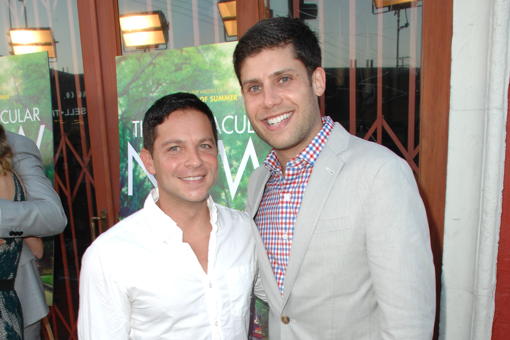 Teller and Ponsoldt were talking at length about the sex scene in an interview and I’m curious how much visual language you actually have in the script about sequences like that, where you know that things are very likely to change on set and have a very different feel.
Teller and Ponsoldt were talking at length about the sex scene in an interview and I’m curious how much visual language you actually have in the script about sequences like that, where you know that things are very likely to change on set and have a very different feel.
Weber: We understand that this is a collaborative medium. If you want to go do this thing all on your own, then we always joke, go sculpt or something. We want a director to come on and hopefully make everything better. For us, we’ll expand upon visuals if it’s crucial to the character or story. Generally speaking we know that the gatekeepers read hundreds and hundreds of scripts per month and we don’t want ours to get lost in the shuffle. So we want it to be a good read. We usually don’t get too bogged down in description and those kinds of visuals, but we’ve been lucky to work with directors that keep us involved so if there’s a discussion to be had the director will come to us. Both Marc and James, a number of times, they asked, “How did you guys envision X” or “When you guys wrote Y, what were you thinking about the look for this?” And then we talk about it. Those are some really fun moments to collaborate like that.
You’ve talked a lot about how well you get along and how you’ve have fallen in love with these different book adaptations you have done and scripts you are working on. I’m wondering if there are any lingering movies or books that you have wildly different opinions on and that you don’t see any middle ground on?
Neustadter: We love reading. We read everything. And I definitely think that we don’t always have the same take. But when we do, that’s the stuff obviously that we would want to collaborate on. Weber loves to read for pleasure. I don’t know where he finds the time to do that…
Weber: You watch a lot more TV than I do.
Neustadter: And I have a child.
Weber: And you have a child. Also, you listen to a lot more music than I do. Books have always been my first love and reading has just been an escape for me my whole life. Less so TV. And you watch everything. You watch a lot of British TV and fun…
Neustadter: I think that pleasure reading is a really great thing, but I’m almost always looking, when I’m reading something, if we can turn it into a movie and Weber actually really enjoys reading it even if it’s not. If it’s a very literary thing that can never be made. I have no time for that, but I’d love to.
Jumping off of that discussion, do any of you write while listening to music or do you have to have silence or do the Starbucks thing?
Neustadter: I only write to music. I can’t write without headphones on and I’m almost always in a coffee shop dealing with a lot of noise around me. I focus better when there’s a lot of activity.
Weber: I live in New York City. We don’t even write in the same place. Scott lives in LA. I’ll just go to any number of great coffee shops or tea rooms in the East Village and just soak up the atmosphere of wherever I’m writing. I like to be out among people even though I’m doing a private, solitary thing in writing.
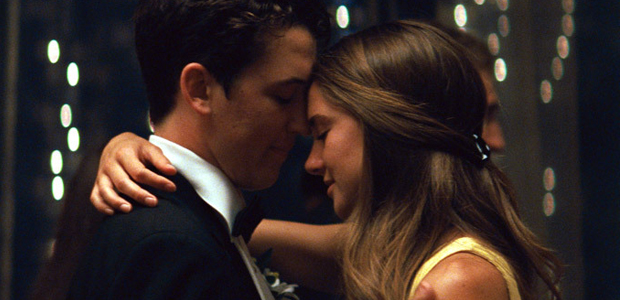
You have talked about how this really can be an anytown USA film, but you did go from a large budget to a small, independent budget and moved out to Athens, Georgia to shoot. I’m curious if you added a lot of visual details while actually on set and in town or did you leave that up to James?
Weber: I think the biggest thing, speaking about that budget issue, when this was a studio movie, the budget was roughly triple what we ultimately shot it for. But that larger budget gives you the freedom to shoot anywhere you want. It gives you the freedom to us more locations. The freedom to have more company moves, to use a location once, more night shooting. The creative challenges of working with a smaller budget were really interesting. But I don’t think it hurt the movie. We managed to find ways that, while we had to cut things we cared about, we worked in lines that we liked from other moments into other scenes. Frankly, doing it independently allowed us to keep it rated R and give it honesty of what the teenage life entails.
While watching this not long after watching Short Term 12, I noticed there is a lot of bleedover in terms of actors right now. Mary Elizabeth Winstead did this and Smashed with James. Miles and Shailene Woodley will be doing Divergent together. Kaitlyn Dever was in this and Short Term 12 with Brie. Shailene was also doing Spider-Man with Marc Webb. I’m just curious if you can feel this sense of community on set that has started to form in the smaller films?
Neustadter: Yeah, I think Brie and Kaitlyn met on the set of The Spectacular Now. They didn’t have a lot of overlap but they were friends from there and they went on to make Short Term 12 and they killed it.
Weber: And Brie and Mary Elizabeth already knew each other cuz they were in Scott Pilgrim. They actually had a lot of memories from that, which was a crazy long shoot.
Neustadter: We’re just really fortunate to work with these people who are super talented and they’re all going to be their own stars very soon.
**Spoilers**
One thing I love is that Miles Teller’s character is trying to decide whether he should self-destruct with her of if he can release her. So often, when you graduate high school, it puts a strain on a relationship and I want to know how you relate to that and how much y’all pulled from the book.
Neustadter: The thing that I think was so fascinating is that this is a guy who thinks he’s doing a heroic thing by distancing himself from somebody, and in the beginning of the movie he seems himself as ‘The Man’. He can do no wrong, and he’s in your head, and he’s the popular guy and everybody loves him. Then there’s this subtle shift in the middle where there’s cracks in that idea. He starts to see the world a little bit more real and the way other people see it as opposed to the way he sees it. When he has that realization, he thinks he’s doing the right thing by getting rid of Aimee, but doesn’t realize the right thing would be is to changing his behavior and embracing this relationship that’s so good. So he starts out trying to save her, but when he realizes that isn’t happening and allowing himself to be saved, he thinks the right thing to do is to let her go. That’s really heartbreaking and dramatic and something we really wanted to explore in the movie.
Weber: Yeah, one of the arcs for Sutter is that he goes from someone who runs away from love to someone who runs towards it. It makes sense given what we see of his childhood and his father leaving him and how he comes to understand love early on versus what he learns throughout the movie.
I like how the film starts off with Sutter and you think he’s this bro — he’s sort of full of himself. Then you slowly start to peel away that facade and even at one point, after his graduation, he’s sitting all by himself. In his world, he’s a big deal. But I guess in the high school world he’s kind of an every man.
Neustadter: I think what’s really exciting for me about the novel is that it’s a first-person narrative told from his point of view. And I don’t think you realize until you’re a little bit deeper in the book that he’s not a very reliable narrator. His version of events is not accepted in the eyes of a lot of people around him. For us it was a really cool challenge to figure out how to do that in a screenplay, visually. How do you show a character that is saying, “Everybody loves me.” Then realizes half way through that that is absolutely not true. So we had a lot of fun with it and we didn’t want to do heavy voice over and we didn’t want to do him breaking into a scene and explaining stuff. Just let it ride. And I think you’re absolutely right, it’s a really fun and cool thing to observe.
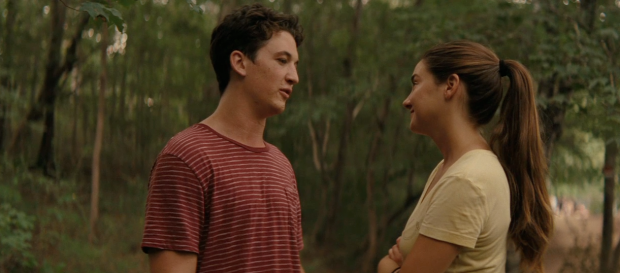
The Spectacular Now is now in limited release.

